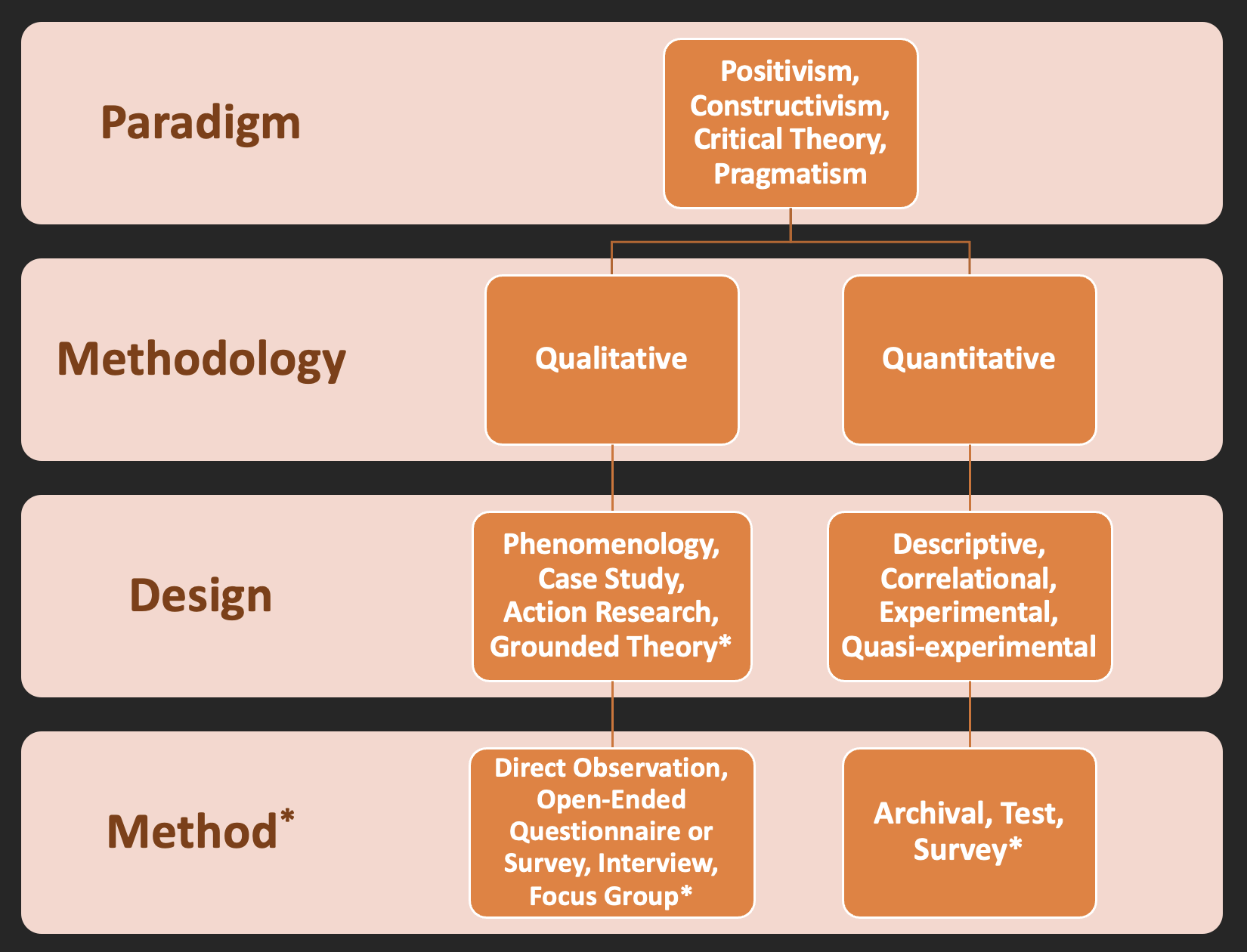Research paradigms are new items I learned recently. Would love to share here.
This blog also includes: research methodlogy, research design, research method.
Research paradigms could be regarded as a kind of worldview, or collectively, worldviews. They are long-standing philosophical assumptions, principles, and tenets that guide particular and sometimes presceiptive protocol for systematic research that may differ by discipline. Examples of research paradigms incldue postvism/post-postivism, interpretivism/constructivism, critical theory, and pragmatism.
Methodology is the system of methods commonly referred to as quantitative, qualitative, or mixed-methods.
Design refers to the assembly of choices for the techniques to be used in a respective study that may include research approach or paradigmatic tradition such as a quasi-experimental design in quantitative research or phenomenology in qualitative research.
Methods are the systematic tools used to recruit, sample, collect, analyze, interpret information.
See figure.1 below for a visual sense of their relationship.

Image credit to NCU Lib https://library.ncu.edu/c.php?g=680748&p=4816265
Design and methods of study will be discussied based on your research questions. Research questions decide which methodology the research will use. Qualitative research questions include:
Exploratory questions - looks to understand something without influencing the results. The objective of exploratory questions is to learn more about a topic without attributing bias or preconceived notions to it.
eg. What are students' perception on the webcam use in online class?
Predictive questions - survey questions that automatically predict the best possible response options based on text of the question. Moreover, these questions seek to understand the intent or future outcome surrounding a topic.
eg. Why do students turning on their webcam in online classes?
Interpretive questions - allows the study of people in the natural setting. The questions help understand how a group makes sense of shared experiences with regards to various phenomena. These studies gather feedback on a group’s behavior without affecting the outcome.
eg. How do you feel the use of webcam in online class?
Quantitative research include:
Descriptive questions - seeks to explain when, where, why, or how something occurred. Moreover, they use data and statistics to describe an event or phenomenon.
eg. What percentage of students prefer turning on their webcam in the online class?
Comparative questions - when studying groups with dependent variables.
eg. Do users on YouTube and TikTok have similar learning habits?
Relationship-based questions - answers influence of one variable on another. Therefore, experimental studies use this type of research questions are majorly.
eg. How does teachers' webcam behaviors influence students' webcam behaviors?
There are four main designs for quantitative research questions.
Experimental Research - Experimentation is conducted in order to test a causal hypothesis (that is, if a researcher wants to determine if an independent variable (X) is the sole cause of any change in the dependent variable(Y)).
Quasi-Experimental Research - Quasi-experimental designs are used when it is not
viable to randomly assign participants to treatment groups. Common non-time series quasi-experiment designs include Cohort Designs, Counterbalanced Design, Non-equivalent Control Group Design, Regression-discontinuity Design, Separate-Sample Pretest-Posttest Designs, and Separate-Sample Pretest-posttest Control Group design.
Correlational Research - Research is correlational when at least two, and often more, variables/conditions are observed and measured and the extent of the relationship is estimated based on tools such as the Pearson Product Moment Correlation, the Spearman Rank Correlation Coefficient, or even Kendall’s Rank Correlation Coefficient.
Descriptive Research - Descriptive research describes individuals in a study that was typically conducted in one of three ways:(a) observational – viewing and recording participants;(b) case study – in-depth study of an individual or group of individuals; and (c) survey – a brief interview or discussion with an individual about a specific topic.
Methods
Reference
https://library.ncu.edu/c.php?g=680748&p=4816265
https://library.ncu.edu/c.php?g=680748&p=4803087
https://www.enago.com/academy/how-to-develop-good-research-question-types-examples/
https://library.ncu.edu/ld.php?content_id=59500910